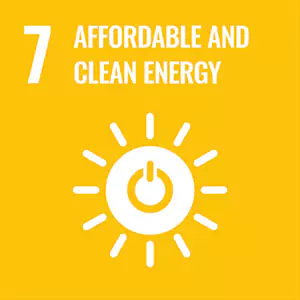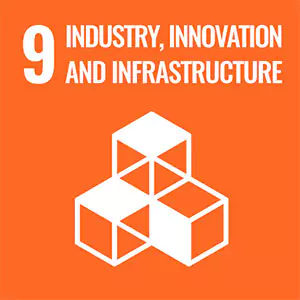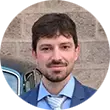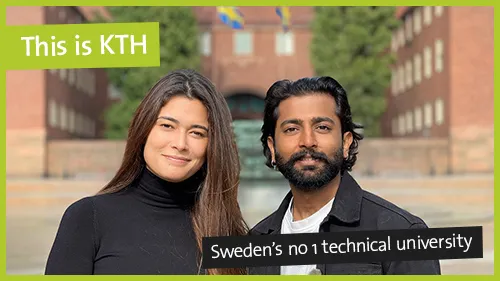MSc Engineering Mechanics
The master's programme in Engineering Mechanics provides a solid and up-to-date knowledge base for the analysis and design of industrial products and processes. Students chose to specialise in one of three tracks, solid mechanics, fluid mechanics or sound and vibration and learn to use advanced simulation and experimental methods to analyse mechanical phenomena. Graduates work in numerous branches with mechanical design, testing, computation and research as managers, engineers, consultants, or researchers.

Engineering Mechanics at KTH
The master's programme in Engineering Mechanics covers theory, numerical methods and experimental techniques related to fluid mechanics, solid mechanics, and sound and vibration. The curriculum is developed with strong industry involvement and is heavily influenced by the latest research. It will prepare you with the knowledge and skills for advanced industrial problem-solving in large and small international enterprises and research organisations.
The programme offers three tracks: Fluid Mechanics, Solid Mechanics, and Sound and Vibration. Only about 40 % of the courses are mandatory, so you have many opportunities to adapt the course structure to your interests based on a large number of elective courses. During the first three semesters, we mix theoretical courses with more applied courses. The courses typically contain experimental and numerical laboratories and provide you with proficiency in up-to-date experimental methods and software. In the courses, you are given many opportunities to interact with prominent researchers at KTH and companies such as the world-leading truck manufacturer Scania and the train and aircraft giant Bombardier, among many others.
The fourth semester is spent working on a five-month degree project, during which you will have the opportunity to investigate a specific topic in depth. You will complete the degree project in industry, at an academic institution in Sweden, or abroad. Students doing their degree projects close to KTH may also take courses parallel to their thesis work.
This is a two-year programme (120 ECTS credits) given in English. Graduates are awarded the Master of Science degree. The programme is given at the KTH Campus in Stockholm by the School of Engineering Sciences (at KTH).
Fluid Mechanics track
The students taking the track in Fluid Mechanics will acquire a deep and widely applicable competence in fluid mechanics, preparing them for their future profession.
Fluid Mechanics as a discipline encompasses physics, mathematics, mechanics, and numerical analysis. You will learn and work with modern theoretical, numerical, and experimental methods to find solutions to various fluid mechanical problems. In addition, extensive high-profile research is carried out within the field of turbulence and turbulent flows, which will be introduced via interaction with our scientists and teachers.
Fluid mechanics is found everywhere, both in nature and in industrial applications. The ability to measure, model and predict fluid flows is critically essential to the innovation of processes and products across almost all industries (for example, aviation and aerospace, automotive, maritime transport, energy conversion, biotech and pharmaceuticals).
Anything that involves a fluid (gas or liquid) is fluid mechanics. These fluids may or may not contain particles such as raindrops in the air, red blood cells flowing in blood, or the fibres found in paper pulp flows. The applications are, for example, found in various energy conversion processes such as wind and wave power, the food process industry, jet engines and conventional combustion engines, but also in vehicle design, where the focus can be directed towards aerodynamic optimisation of, for example, wings on aircraft and minimising fuel consumption.
Solid Mechanics track
The students in the Solid Mechanics track benefit from dedicated facilities, including their own premises and a specialised computer laboratory. Our faculty places strong emphasis on continuous communication with students to ensure a high level of engagement and support. Our goal is to provide you with knowledge in all the technical aspects of Solid Mechanics analyses, which are in great demand in many industries, as most industrial sectors are faced with stiffness and strength-related challenges. Your future occupation can include working with computational stress and strain analysis, design, development, research, or testing.
Solid Mechanics is a discipline that encompasses mathematics, numerical analysis, mechanics, and physics. It also involves several aspects of Materials Science and Industrial Design. In addition, the field is actively applying the latest advances in artificial intelligence (AI), particularly in conjunction with measurements and data analysis. Solid Mechanics is a field undergoing constant innovation and research, both in Sweden and globally. The driving force in this work is the development of new materials and their utilisation for advanced product functionality, improved durability and reliability, and minimising the adverse environmental impact. At KTH, we contribute to this progress by focusing on two key areas. First, we devote significant effort to developing tools to facilitate the design of new products through better descriptions of material mechanical properties and formulating appropriate design criteria. In addition, we actively develop and use scientific computational tools widely adopted by the industry for Solid Mechanics and interdisciplinary analyses.
Sound and Vibration track
Everywhere in our modern society, we are exposed to sound and vibrations, from pleasant sounds of birdsong or music through sound carrying information to unpleasant or even harmful noise and vibration from, for instance, traffic and construction work. Technical acoustics applications cover a vast field, from applied mathematics via signal processing to engines, transport, and building technology. The Marcus Wallenberg Laboratory for Sound and Vibration Research (MWL) is the largest university centre for sound and vibration research in northern Europe.
As a student in the Sound and Vibration track, you will learn acoustics with application to noise and vibration control, and you can develop your specialisation through numerous courses within the subject. The demand for acoustics in industries and in applications, for instance, in vehicle engineering and the shift to electrical propulsion, flow-induced sound, electrical engineering and suspension systems, underwater acoustics and societal impact for building acoustics and environmental noise.
Sound and Vibration as a discipline encompasses mathematics, numerical analysis, mechanics, and physics. It also involves several aspects of sustainable development. The programme has a good balance between theoretical studies and practical applications. It gives you a platform for both a successful career in the industry and continuation towards a PhD.
Courses in the programme
The courses in the programme cover topics such as continuum mechanics, material mechanics, fatigue and fracture, biomechanics, turbulence, stability, finite element method, computational fluid mechanics, acoustics, vibro-acoustics, and flow acoustics.
Courses in the programme Engineering Mechanics
Future and career
Graduates from the master’s programme in Engineering Mechanics are proficient in fluid mechanics, solid mechanics or sound and vibration, areas linked with a multitude of industries. As a result, you will find a wide range of job opportunities in research and development within the industry, consulting, and research, not only in mechanical engineering but also in other engineering fields.
Typically, graduates work as design engineers, testing engineers, calculation engineers, researchers, consultants, and specialists at companies such as ABB, Airbus, FS Dynamics, Ericsson, Alfa Laval, COMSOL, Sandvik, Scania, Tetra Pak, AFRY and Volvo. In addition, many graduates also pursue doctoral studies at KTH or other internationally renowned universities.
Sustainable development
Graduates from KTH have the knowledge and tools for moving society in a more sustainable direction, as sustainable development is an integral part of all programmes. The three key sustainable development goals addressed by the Master's programme in Engineering Mechanics are:



Engineering mechanics plays a key role in almost any major energy conversion process. With a degree in Engineering Mechanics, you can contribute to, for example, assessing the structural integrity of nuclear power plants and wind turbines and the design of wind turbine parks to maximise energy harvesting. The skills you acquire from the programme can also be used to develop the materials, manufacturing processes and testing methods.
Engineering mechanics is of utmost importance in the design processes for many industrial products and systems. The knowledge and skills you will learn, such as novel experimental techniques and advanced simulations, will make you a key contributor to new sustainable innovations.
Disturbance from noise and other undesirable sounds is essential in developing sustainable cities and communities. Graduates from engineering mechanics will be perfectly equipped to contribute to designing noise-free products and systems related to transportation, energy conversion and structural integrity, among other things.
In addition, the programme contributes to other sustainable development goals. One example is good health and well-being by offering several courses in biomechanics related to medical issues such as vascular disease and human mobility. Another one is contributing to the development of materials made of natural fibres.
Faculty and research
The engineering mechanics research at KTH is renowned internationally, and KTH is currently ranked 25 worldwide for Mechanical Engineering in the QS World University Rankings by Subject. Research fields where engineering mechanics faculty at KTH continuously make significant contributions include high-Reynolds number turbulence, geophysical flows, micro- and complex fluids, fluid flow control, material mechanics, biomechanics, paper mechanics, fatigue and fracture, reliable design, aeroacoustics, structural damping and non-linear vibrations. The programme is hosted by the Department of Engineering Mechanics .
There are more than twenty professors involved in the Engineering Mechanics programme as course instructors and supervisors for degree projects. Many are well-known world-leading scientists recognised for their teaching skills and pedagogical achievements.
The Engineering Mechanics programme at KTH is strongly linked to the Odqvist Laboratory of Experimental Mechanics. This laboratory is equipped with the latest experimental devices for testing at different length scales, ranging from full-scale product testing to testing at the microscale. The Engineering Mechanics programme also has access to many state-of-the-art software for computational mechanics and to the National Academic Infrastructure for Supercomputing in Sweden, NAISS.






